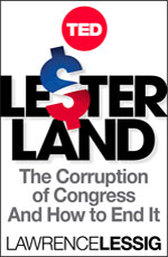Money In Politics
"There are two things that are important in politics. The first is money. I can't remember what the second one is."
Sen. Marcus Hanna in 1895
Sen. Marcus Hanna in 1895
|
Lawrence Lessig- LesterLand
We the People and the Republic we must reclaim. (an 18 min. video) 
There is a corruption at the heart of American politics, caused by the dependence of Congressional candidates on funding from the tiniest percentage of citizens. That's the argument at the core of this blistering talk by legal scholar Lawrence Lessig. With rapid-fire visuals, he shows how the funding process weakens the Republic in the most fundamental way, and issues a rallying bipartisan cry that will resonate with many in the U.S. and beyond.
|
Money as Speech
What the Supreme Court ruling in CU v. FEC means in real terms and how it needs to be addressed in a Constitutional Amendment. "Money as Speech" by pewestlake is licensed under a Creative Commons Licence. Run time: 05:06 minutes Simple Logic:
If Money equals Speech Then Speech is not Free |
Money from the wealthy and corporations harms democracy in at least five ways.
- Limits viable candidates. Individuals with good ideas, significant life or community experience, and/or strong personal integrity who desire to run for public office are often deterred knowing that to be politically competitive requires significant resources that they may not have or are unable to raise. [more]
- Distorts political agenda. The requirement to attract major dollars to be viable means candidates must address only those issues political contributors/investors approve. [more]
- Corrupts public policy. Pay-to-play is often all about what major political money represents from the wealthy and corporations. “What you get is what you pay for,” describes how many believe the government works. [more]
- Distorts political news. As more political money is raised, more is spent. Much of this spending is on media advertising, which is enormously profitable.* [more]
- Deepens depoliticalization. The greatest threat to democracy of big money from the wealthy and corporations is arguably the ever-increasing unattractiveness of politics in general, and elections in particular, by the majority of citizens. [more]
Buckley v. Valeo, 424 U.S. 1 (1976), was a case in which the Supreme Court of the United States struck down several provisions in the 1974 Amendment to a law that limited campaign expenditures, independent expenditures by individuals and groups, and expenditures by a candidate from personal funds. The Court upheld the provision which sets limits on individuals' campaign contributions.
The Bipartisan Campaign Reform Act (McCain-Feingold)* of 2002 was probably the most noteworthy campaign-finance reform legislation since Buckley.** Its final version, repeatedly watered down over seven years, ended up addressing only two issues-- establishing limits on “soft money” donations to campaigns and establishing time limits before elections when corporations can run “issue advocacy ads.”*
* see Coleridge, G. for references




